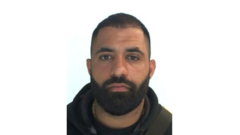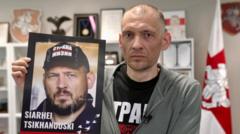In a poignant account, Mark Lowen, a BBC correspondent, sheds light on his unexpected detention and subsequent deportation from Turkey, where he was covering anti-government protests. Despite being held for hours and denied access to legal representation, he emphasizes the plight of journalists in Turkey, a country grappling with increasing authoritarianism.
BBC's Mark Lowen Details Harrowing Deportation from Turkey Amid Protests

BBC's Mark Lowen Details Harrowing Deportation from Turkey Amid Protests
Mark Lowen recounts his abrupt detention and deportation after covering protests in Istanbul sparked by the arrest of a key political figure.
Mark Lowen, the BBC correspondent, experienced the shocking reality of being deported from Turkey shortly after expressing his joy at returning to the country where he previously lived. Just three days into his assignment, he received a phone call in his hotel room, requesting his urgent presence downstairs, leading to an encounter with three plain-clothes police officers who detained him for covering the anti-government protests in Istanbul.
The protests erupted following the arrest of Ekrem Imamoglu, the mayor of Istanbul and a main political rival to President Recep Tayyip Erdogan. Initially held at police headquarters, Lowen described the atmosphere as relatively cordial, with some officers expressing dissent toward the state's decision. However, the situation shifted dramatically when he was moved to the foreigners' custody unit where he was denied legal representation, subjected to fingerprinting, and received a deportation order citing his presence as a "threat to public order."
Throughout the ordeal that lasted 17 hours, Lowen shared that he had the unwavering support of BBC management and the British Consulate, a privilege many journalists in Turkey do not have. The country has been known for its oppressive stance towards the media, ranking 158th out of 180 on the Press Freedom Index reported by Reporters Without Borders.
While being held, Lowen witnessed firsthand the systematic suppression of dissent as eleven journalists among thousands of detainees joined the fray facing government crackdowns following Imamoglu's arrest. The broader unrest reflects a struggle for democracy in Turkey, increasingly perceived to be sliding into authoritarianism under Erdogan’s rule.
As protests continue to swell and demand voice against Erdogan's administration — which he derogatorily labels as "street terrorism" — the significant question remains: will the momentum of Turkey's largest protests in over a decade effectively contest the steadfast grip of the longtime leader?




















